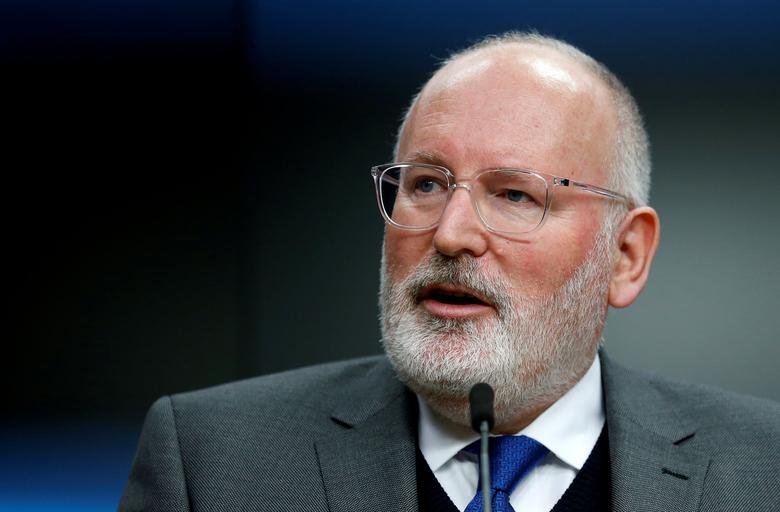If Frans Timmermans can persuade enough people to embrace the European Green Deal, the European Union will become the first carbon-neutral continent on the planet by 2050, leading the world toward a more sustainable, equitable, and economically vibrant future.
That’s the plan, anyway.
Timmermans is executive vice president for the E.U. Green Deal, a comprehensive set of policy initiatives designed to transform the E.U. into both an energy-efficient economic powerhouse and a fairer, more pleasant place to live. The $1 trillion-dollar plan involves re-thinking almost every industry in Europe — from energy production, transportation, and farming to technology, architecture, steel, and cement. The plan also introduces new rules of environmentally conscious behavior for companies, financial markets, and citizens.
“The economic realities are sinking in — there is simply no future in coal,” Timmermans insisted during a recent Thomson Reuters Newsmaker interview with editor-at-large Axel Threlfall. In the interview, Timmermans also discussed the urgency of bold leadership in addressing climate change, the challenges involved, and why he is generally optimistic that his grandchildren will not be living on a charred cinder of used-up stardust.
A once-in-a-century opportunity
Timmermans said he is “encouraged” by the fact that despite people’s immediate worries about the pandemic, their jobs, health, and loved ones, “their worries about the climate crisis have not disappeared or even diminished,” he said. And that collective public concern is finally translating into concrete political action, he claimed, because “the position of leaders reflects what’s happening in society.”
Indeed, a key tenet of the E.U. Green Deal is that climate sustainability and economic prosperity can go hand in hand, and that aggressive climate policies represent a once-in-a-century opportunity to spur growth and create a more competitive economy. Europe is betting that the future lies in renewable energy and innovative technology; and, in the race for competitive advantage, it’s companies and the private sector that are leading the charge, not political leaders, Timmermans explained.

“Politics has become more short-term because citizens have lost trust that we’re doing the right things in the long-term,” Timmermans added. “Whereas businesses, especially big corporations, have to think long-term for their survival, so they’ve seen the light earlier than many politicians.”
Human life (and capitalism) re-imagined
It is difficult to overstate the scope and ambition of the Green Deal, because it really is a comprehensive re-imagining of how Europeans should work and live — prompted, Timmermans said, by the severity of multiple challenges facing the human race, such as the ongoing pandemic, the climate crisis, the biodiversity crisis, and the technological revolution. “These are all tectonic changes,” Timmermans said. “And they are going to affect every economic structure and every industry. We’re seeing it already.”
Interestingly, another goal of the Green Deal is to manage the transition to a more sustainable society in a way that corrects the most egregious imbalances of capitalism and creates a more equitable economic playing field for everyone. “The task of legislators and politicians is to provide the right circumstances, so that these tectonic changes don’t lead to huge injustices in our society,” Timmermans said.
Past industrial revolutions have led to enormous inequalities, he noted, and the Green Deal seeks to prevent these injustices from happening by providing “the right legal and political framework so that [economic] redistribution in this tectonic shift leads to nobody being left behind.”
Harnessing the market
Harnessing market forces to change the behavior of oil companies is an important aspect of the Green Deal as well. Timmermans said he is confident that many (though not all) oil companies are ready to transition to clean energy — but only if they can see a path to continued profitability. “I think there is a genuine undertaking in many of these companies to make this transition, but we have to provide them with the right incentives,” he said. Legislative guidance (e.g., carbon pricing), market predictability, a sustainable energy grid, better access to electric mobility are all things that “will help oil companies understand that they need to invest in things other than oil,” Timmermans said.
“…Businesses, especially big corporations, have to think long-term for their survival, so they’ve seen the light earlier than many politicians.”
In fact, a massive investment in clean technologies is another lynchpin of the Green Deal, but the emphasis isn’t on new research and development — it’s on accelerating the marketability of already existing technologies. “We are not talking about completely new technologies that have to be invented,” Timmermans said. “We are talking about bringing a number of new technologies to the market.”
For example, Timmermans predicted that in six to seven years, Europe would be producing commercially competitive “green steel” — steel made from hydrogen — and introducing a wide range of technologies, such as 5G, batteries, green hydrogen, and a clean-energy mobility grid that will accelerate the transition to a more sustainable future. “The technology is there — it’s just not good enough for the market yet,” Timmermans said, noting that investment in these technologies is necessary so that “they can be upscaled and applied in the market as soon as possible.”
The rest of the world
No matter how energy efficient Europe becomes, however, it only represents about 9% of the world’s carbon emissions, so international cooperation in the larger global effort to combat climate change is essential. Europe is happy to take a leadership role, Timmermans said, but to succeed, he emphasized, “the rest of the industrialized world will have to make comparable efforts, and parts of the world that are still industrializing will have to be supported.”
Any climate initiative that does not eventually include China, India, and the United States is doomed to fail, of course, but Timmermans sees encouraging signs there as well. China’s recent pledge to de-carbonize its economy by 2060 is a significant step in the right direction, he noted. And in the U.S., Timmermans pointed out that Europe has extensive networks of cooperation with American companies, universities, states, and cities that will continue regardless of who wins the upcoming U.S. presidential election.
Still, communicating the urgency of climate crisis in a way that inspires optimism and hope is no easy feat, and Timmermans said he is all too aware of the stakes. “Our societies are going through fundamental change, and there is a strong understanding across the board — in the private sector, financial sector, politics, and society — that we need to steer and organize that change to avoid the worst,” Timmermans said.
“This is a huge opportunity, but it’s going to be bloody difficult to get there, and we could stumble and fall if we’re not very careful.”







